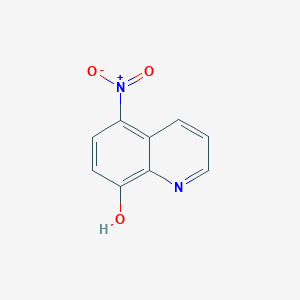Harvard scientists have found that key factors affecting breast cancer metastasis may reduce the spread of cancer cells
-
Last Update: 2020-02-24
-
Source: Internet
-
Author: User
Search more information of high quality chemicals, good prices and reliable suppliers, visit
www.echemi.com
As we all know, cancer cell metastasis is one of the biggest challenges in cancer treatment Take breast cancer, the most common cancer among women, as an example In view of the primary tumors in the early stage, the survival rate and quality of life of the patients have been greatly improved by various diagnosis and treatment methods developed in the past 40 years; however, the 5-year survival rate of the patients with metastatic breast cancer is only 27% There is no doubt that the development of new therapies to control cancer metastasis is crucial for patients Recently, science, a leading academic journal, published a research paper from Harvard Medical School and cancer center of Massachusetts General Hospital Researchers found that the invasion and poor prognosis of breast cancer are closely related to the content of ribosomal protein More importantly, on the basis of the existing targeted therapy, regulating the ribosome function of cancer cells can effectively reduce the spread of breast cancer in mouse models The type of cancer scientists are concerned about is called hormone receptor (HR) - positive breast cancer, which accounts for about 70% of all breast cancers HR positive means that estrogen receptor (ER) and progesterone receptor (PR) can still play a normal role in the carcinogenesis of cells The growth of cancer cells is regulated by estrogen and progesterone, so endocrine therapy is quite effective for this kind of breast cancer However, HR positive breast cancer has a feature that can not be ignored After many years of tumor resection and adjuvant treatment, it may be transferred to other parts of the breast for recurrence, such as the lung, brain and bone ▲ metastatic breast cancer seriously threatens the quality of life and life of patients (photo source: 123rf) The team collected blood samples from patients with metastatic HR positive breast cancer and enriched them with cancer cells, known as circulating tumor cells (CTC) These cancer cells shed from the original tumor and spread throughout the body through the blood A small part of them will start to proliferate at the right time and form a larger tumor Using CRISPR activation (crispra) technology, the researchers screened the genes in the genome of circulating tumor cells to promote metastasis in mouse models This technique combines cas9, which has no nuclease activity, with different sgRNA to activate the transcription expression of different target genes ▲ crispra was used to screen genes in CTC to promote metastasis (picture source: reference [1]) In addition to the known oncogenes and genes related to cell growth and movement, they accidentally found that several ribosomal proteins (RP) were related to the metastatic potential of breast cancer cells Ribosome is an important device to translate RNA into protein in cells Ribosome protein is the structural protein that makes up ribosome For cancer cells, proliferation requires the synthesis of a large number of proteins, and translation equipment is indeed indispensable Further experiments showed that although there are dozens of core RP components in ribosome, the high expression of these selected RP, especially rpl15, can significantly improve the ribosome content of circulating tumor cells and improve the overall translation ability When the researchers injected the breast cancer cells with excessive expression of these ribosomal proteins into mice, the number and size of metastases formed in the lung, ovary and other parts of mice increased significantly after a period of time ▲ CTC overexpressing ribosomal protein rpl15 significantly promoted the formation of metastasis in mice (picture source: reference [1]) Returning to the cohort of patients with metastatic breast cancer, the researchers further confirmed that the expression of ribosomal protein gene in circulating tumor cells was higher in patients with higher invasiveness and lower survival rate through single cell RNA sequencing Based on this finding, the researchers tested a new combination of targeted therapies The combination of omacetaxine, a ribosome translation inhibitor, and palbociclib, a breast cancer cell proliferation inhibitor, can not only enhance the inhibition of rpl15 high expression circulating tumor cells in vitro, but also delay or prevent metastasis in metastatic breast cancer mice ▲ at the same time, it can inhibit ribosome translation and breast cancer cell proliferation, and significantly inhibit CTC with high ribosome protein expression (picture source: reference [1]) It is worth mentioning that piperacillin, as an innovative targeting drug, has been approved by the FDA of the United States and China food and Drug Administration for the treatment of locally advanced or metastatic breast cancer with HR positive The experimental results support the feasibility of the new target combination "These early results suggest that for aggressive circulating tumor cells characterized by high RP expression, inhibition of cell translation mechanisms and cell proliferation pathways may be a promising therapeutic approach," the authors write
This article is an English version of an article which is originally in the Chinese language on echemi.com and is provided for information purposes only.
This website makes no representation or warranty of any kind, either expressed or implied, as to the accuracy, completeness ownership or reliability of
the article or any translations thereof. If you have any concerns or complaints relating to the article, please send an email, providing a detailed
description of the concern or complaint, to
service@echemi.com. A staff member will contact you within 5 working days. Once verified, infringing content
will be removed immediately.







